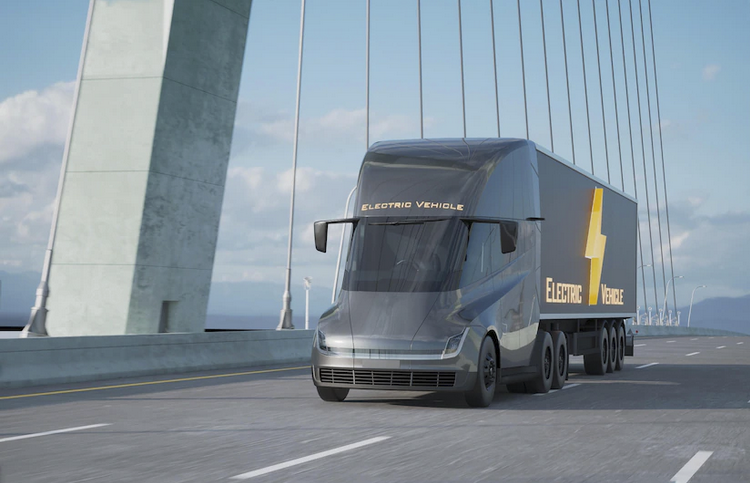Electric trucks represent a significant advancement in urban logistics. These vehicles are equipped with one or more electric motors, reducing their carbon footprint by eliminating greenhouse gas emissions. As businesses aim to reduce their environmental impact, electric trucks have the potential to contribute to a more sustainable supply chain.
A report by the consulting firm PwC, “The Dawn of Electrified Trucking,” states that the use of electric trucks will increase in the coming years, with zero-emission vehicles accounting for one-third of all trucks in Europe, North America, and China by 2030. By 2035, this percentage will rise to around 70%. This shift is due to increasingly stringent regulations and the declining cost of electric commercial vehicles.
However, as a new technology, electric trucks still raise questions such as range, energy consumption, and battery life. Tesla is developing the Semi, an electric truck that can travel up to 800 km on a single charge and recover up to 70% of energy in just 30 minutes of charging. Meanwhile, Germany’s DHL is working on StreetScooter, electric delivery vans with a range of up to 500 km.
Applications of electric trucks in logistics
The logistics industry is transitioning to electric trucks to enhance the efficiency of goods delivery. The advancement of batteries and the latest generation of motors have the potential to increase the use of electric vehicles in urban logistics for delivering orders to the physical point of sale or for home delivery. The last mile, one of the most polluting and expensive stages of the supply chain, could be optimized by using electric trucks. By not utilizing fossil fuels, these vehicles can decrease logistics costs and consequently decrease the impact of transportation on the selling price of products.
The consolidation of e-commerce has not only led to an increase in home deliveries, but it has also amplified vehicle traffic in major cities due to reverse logistics. At present, a large number of trucks with combustion engines circulate in cities to deliver goods, collect returns from customers, and send them back to the warehouse. Electric trucks would reduce the costs of these trips and enable the implementation of more sustainable logistics strategies.
Advantages of electric trucks
As electric trucks gain popularity in the market, companies can reap the benefits of:
- Energy efficiency. Electric vehicles are more energy efficient than internal combustion vehicles. They use 15-20% less energy when braking or stopping, which is a substantial difference compared to the 64-75% of energy consumed by gasoline engines.
- Environmental sustainability. Electric vehicles do not emit polluting gases through the exhaust pipe. With lower CO2 emissions, the use of electric trucks in logistics can help to minimize the carbon footprint in the transport sector and improve air quality in cities.
- Reduced energy costs. In the face of rising gasoline and diesel prices, replacing combustion engine vehicles with their electric counterparts could reduce costs. Even if the price per kilowatt-hour also increases, electric trucks will always be more profitable than vehicles that use fossil fuels.
- Lower maintenance. Electric motor vehicles require less maintenance, as they do not require oil, coolant, or engine filter changes. Proper maintenance of electric trucks only requires a thorough check of the condition of the batteries and other components common to all vehicles, such as brakes and tires.
- Tax advantages. More and more governments are committed to limiting the carbon footprint in their countries and are promoting legislation that favors the replacement of internal combustion vehicles with electric vehicles. In many places, regulations are being promoted that offer tax benefits to organizations and individuals who choose this type of vehicle.
However, electric trucks still have a high cost, which is not feasible for all companies, despite being cutting-edge technology. Additionally, the charging points implemented in the territory are still inadequate to serve electric vehicles for road transport.
Seamless Entry into Latin American Markets: Xborder’s Expertise in Logistics and Customs Clearance
In conclusion, the use of electric trucks in logistics is a growing trend that offers multiple benefits to companies and the environment. Adopting this technology can improve supply chain efficiency, reduce transportation costs, and help to decrease the industry’s carbon footprint.
Therefore, if you plan to expand your logistics operations in Latin America, we recommend considering Xborder’s services. This company has extensive experience in logistics and customs solutions, and can help you efficiently and sustainably bring your products to the Latin American market.
Xborder provides tailor-made solutions for foreign companies seeking to enter the Latin American market. With its transportation and logistics expertise, the company can assist you in designing an efficient and sustainable logistics strategy, including the use of electric trucks and other innovative solutions. Additionally, Xborder has a wide network of reliable partners and suppliers in the region, ensuring quality and safety in each of your product’s transportation and delivery processes.
For further information, please visit our website: www.xborder.co.









